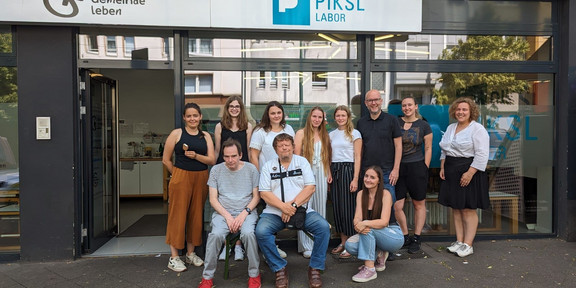2023
Digital participation labs: student group advises PIKSL initiative

"It is incredibly important to be held up to the mirror, to reflect where we are today and where we need to improve. It helps us to move forward," Bernhard Spelten, network manager of the PIKSL initiative, summarized the discussion after two intensive hours . There was a lot to talk about: For almost a whole year, the students, led by PD Dr. Christoph Kaletka, have researched the PIKSL initiative. PIKSL stands for "Person-centered interaction and communication for more self-determination in life". PIKSL laboratories are open places for all people who want to get to know digital media better. People with and without disabilities work together in the laboratories.
After many interviews, evaluations and analyses the time had finally come: On June 20th 2023, the results of the project group were presented in the PIKSL laboratory in Düsseldorf. The aim of the students was to trace the innovation biography of PIKSL, to record developments and changes in the initiative. In the research process, PIKSL was regarded as a social innovation, since digital participation is supported in a particularly participatory way. The students had focused on four thematic areas in particular: the development of the participatory approach as PIKSL’s unique selling point, the financing of PIKSL, growth from setbacks since the initiative’s launch in 2012, and the implementation of goals in the recent growth phase starting 2017.
Based on the research results, the project group formulated various recommendations for action and discussion approaches for the PIKSL team. These recommendations for action have now been presented in Düsseldorf. The suggestion of a joint day of festivities in all PIKSL laboratories in 2024 to make PIKSL even better known and to bring the laboratories closer together in all their diversity met great approval. The future financing strategy was also discussed with considerable interest. The PIKSL Mobil project, in which teams of people with and without disabilities visit elderly people's or nursing homes to teach digital skills there, is also to be intensified in the future. "Perhaps as a PIKSL pop-up, in which suburbs or rural regions can be accessed by a PIKSL car ", considers Helen Rademakers, responsible for media education and knowledge management at PIKSL.
The group of students includes Tabea Lena Brunner, Dakota Buchholz, Victoria Forstmann, Viktoria Grohs, Sofia Heß, Leona Jaspert, Josepha Paetzold, Marie Lilian Rudolph, Neele Storost and Louisa Marie Voß.




![[Translate to English:] [Translate to English:]](/storages/zentraler_bilderpool/_processed_/a/f/csm_Kontakt_b86e8d8ecc.png)
![[Translate to English:] [Translate to English:]](/storages/sfs-sowi/_processed_/7/e/csm_header_collage_sfs_eving_sozialforschungsstelle_dortmund_31bd3c09fb.jpg)